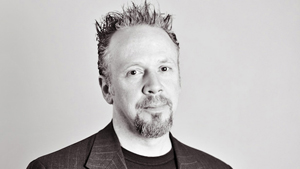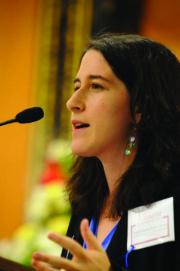Photographer Lisa Kristine traveled to Nepal to document modern-day slavery, including this young girl who started carrying stones because her family is in debt bondage. (More at http://www.lisakristine.com)
By Liane Membis, CNN
It seems impossible.Human trafficking cases, blind promises of freedom, forced prostitution rings — these aspects of modern-day slavery come to light all too often.
Estimates of the number of slaves worldwide range from about 10 million to 30 million, according to policymakers, activists, journalists and scholars. Approximately 100,000 victims are in the United States, working as slaves inside homes, in agricultural fields, in the sex industry and other places, according to the U.S. Department of State’s 2011 Trafficking in Persons Report.
That’s millions of women, children and men struggling to escape captivity. That’s millions of people wondering what it means or what it would take to be free again.
But what about solutions - How can we end modern-day slavery? Three experts weigh in what businesses, governments, the public and individuals must do.
Activist: We must believe that change can happen
Rob Morris is president and co-founder of Love 146, a non-profit organization that works to combat child sex trafficking.

I think first of all it will take the audacity to believe that we CAN end it. Considering the overwhelming stats of how many slaves exist today and how much money the sale of human beings generates, some would call it naive or idealistic to believe we can end it. I prefer to think that it is audacious. And it has only been people of audacity that have ever changed the world. Was it naive or idealistic for a William Wilberforce who fought against the trans-Atlantic slave trade in Great Britain to believe that it could and should end? No. It was audacious. And it came to an end. Was it naive or idealistic for a Martin Luther King Jr. to stand up on the Washington Mall and cry; "I have a dream!" No. It was audacious. I could go on and on.
It will take tenacity. We need to be committed for the long haul. Albert Einstein said; "It's not that I'm so smart, it's just that I stick with problems longer." In other words ... we don't give up ... even when it gets hard. The reality is traffickers are committed 24/7. We must be at least that committed to stopping them. I love the words of jazz singer Billie Holiday who sang; "The difficult I'll do right now. The impossible will take a little while."
It will also take a collective effort. I love that U.S. Secretary of State Hillary Clinton added a fourth "P" to the international framework in combating human trafficking. In addition to Prevention, Protection, Prosecution, she added "Partnerships." If we are going to end modern-day slavery, governments, non-government organizations, law enforcement, service providers, communities of faith, businesses and corporations, individuals, all have to work together. The reality is traffickers make up such a small fraction of the human race. Then there is the rest of us.
Rabbi: Money and knowledge is power
Rachel Kahn-Troster is a strong supporter for the interfaith movement against slavery and Director of Education and Outreach Rabbis for Human Rights in North America.

We need to all learn the signs of slavery. One thing that strikes me when I read about examples of modern slavery in the United States is how many of them were found by nosy neighbors. People who noticed a nanny who never left the house, for example, or a hotel worker who noticed a child who seemed scared and not with people they knew. We have to know what questions to ask and how to direct victims to the right services, for example, the National Human Trafficking Human Resources Center.
Slavery is an issue that is hidden in the open - we choose not to ask questions about the price of goods that we buy or the labor that produces those goods. But once we know how to recognize slavery, we have to act and we have to help victims.
I think it is also important to work with businesses - no business truly wants to be built on the work of slaves, but they need incentives to create transparency in their supply chains. And as consumers, we don't want to buy chocolate that comes from child slave labor in the Ivory Coast, or tomatoes picked by slaves in Florida. The first step is to make educated choices as a consumer: buying fair trade tea and coffee and chocolate, for example, or only buying tomatoes from companies and grocery stores that have signed on to the Campaign for Fair Food. But we have to go beyond being a consumer to being an activist, writing to corporations that don't have policies about slavery in their supply chains (along the lines of the California Transparency in Supply Chain Act) or who don't buy fair trade and telling them that we are choosing to spend our money elsewhere.
We also need to learn about government policies that root out slavery - the Trafficking Victims Protection Act for example, or laws that prevent the exploitation of workers here legally - and ensure there is enough funding to implement them and provide services to victims of trafficking. In today's economic climate, times are tough and budgets are being cut, but we have to ensure that the most vulnerable among us are supported. Compared to the defense budget, the amounts of money our government spends to fight slavery is relatively small. Surely, we can do better.
Ultimately, slavery is a moral question: In the land of the free, how much of our lives are build on the work of those who are not free? Slavery is a human rights crime of the highest nature. We have to live to a higher moral standard than that created by slavery, protesting that human lives are not cheap commodities to be bought and sold. We have be prepared to say that we are not willing as Americans to be complicit in slavery. We have to make ourselves aware, and then we have to do something.
Researcher: Academic research should influence the public hemisphere
Christina Bain has been addressing issues on human trafficking and domestic violence in Massachusetts since 2005. She currently serves as the Director of the Program on Human Trafficking and Modern-Day Slavery at Harvard Kennedy School’s Carr Center for Human Rights Policy.

In order to prevent modern-day slavery, key areas to develop are public and private partnerships and social entrepreneurship within an academic setting.
One example of a partnership took place in March 2011. During the 2011 Harvard Social Enterprise Conference, the Kennedy School’s Program on Human Trafficking and Modern-Day Slavery co-created a panel at the Harvard Business School focused on the role that businesses can play in preventing modern-day slavery. The panel featured representatives from LexisNexis, The Body Shop and Panjiva and addressed how every business can tackle modern-day slavery, whether through supply chain management; allocating business capital to assist non-governmental organizations; or human resources training.
Academia can also work with the public and corporate sectors to produce multi-disciplinary professional development trainings. These trainings would give promising practices in combating modern-day slavery to not only current law, business and public policy students, but public health professionals, law enforcement and corporate leaders.
By effectively combining resources, tools and knowledge, public/private partnerships and academia could begin to meet the challenges of modern-day slavery prevention.


No comments:
Post a Comment